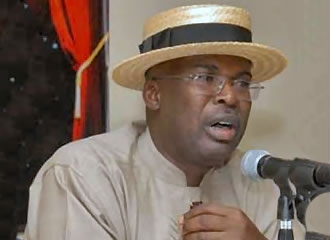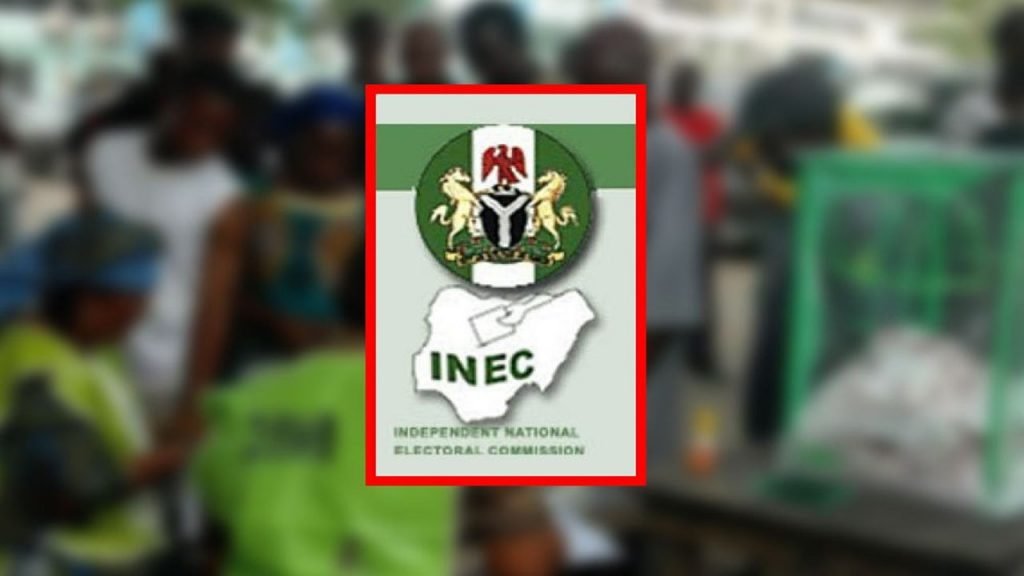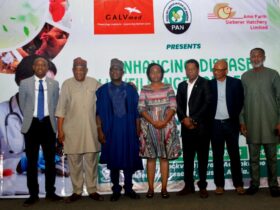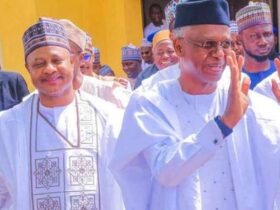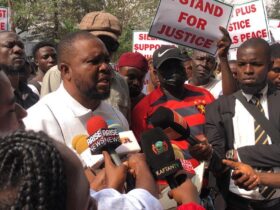The Independent National Electoral Commission, INEC has filed a preliminary objection seeking to strike out the election petitions filed by People Democratic Party,PDP, and it’s Presidential candidate Atiku Abubakar.
INEC denied Atiku claimed that there was a “collation system of the I“ Respondent” to which Polling Unit results were mandatorily required to be electronically transmitted.
Atiku Abubakar and PDP had in their petition challenged the victory of Tinubu Bola Ahmed in February 25, 2023 presidential election and asked the tribunal to declared Atiku as the winner of the election.
INEC in its preliminary objection filed on Tuesday through the lead counsel Abubakar Mahmoud prayed the Presidential Election Petition Court to strike out Atiku petition for being grossly incompetent,an abuse of court processes, vague and academic.
The electoral body said that the averment of the petition that the President – Elect , Tinubu Bola Ahmed was not qualified to have contested the election was not supported by any fact and that the petitioners prayer can not be granted.
INEC said that Atiku only obtained 25 percent of the votes cast in Adamawa, Akwa-Ibom,Bauchi ,Borno, Bayelsa, Delta ,Ekiti, Jigawa ,Gombe, Kaduna, Katsina, Kebbi, Kwara , Nasarawa,Niger, Osun, Sokoto, Taraba,Yobe and Zamfara States which is less than two- third of 25 % of 36 States and the Federal capital Territory Abuja.
On the non off load of poll results through BVAS , the electoral body stated that in further reply to paragraph 19 of the Petition, the 1st Respondent states regarding the use of technology, that it has since 2011, made concerted efforts to improve the quality of elections by the use of appropriate technology and technological devices to enhance the ease, credibility, transparency and integrity of the electoral process.
These efforts include the introduction and use of Permanent Voter Card (PVC), the Electronic Voter Register (EVR), the Bimodal Voter Accreditation System (BVAS) and technological devices to assist Persons with Disabilities (PWDs).
“BVAS is a system that comprises software and hardware components. It allows for voter authentication using fingerprint and facial recognition technology. It can also be used to scan and electronically transmit Polling Unit election results to the INEC Result Viewing (IREV) portal.”
The 1st Respondent states that the public statements credited to its chairman and other Officials referred to in paragraph 19 of the Petition were statements assuring the public of the Ist Respondent’s commitment and
determination to continue the use of technology and technological devices
to enhance the quality, transparency, integrity and credibility of the electoral
process as provided under the Electoral Act 2022.
INEC “states however, that the use of such technology is as prescribed by it pursuant to the Electoral Act and the Regulations and Guidelines for the Conduct of Elections, 2022.
“Further to the above, the Ist Respondent duly prescribed the use of Bimodal Voter Accreditation System (BVAS) to verify, authenticate and accredit voters at the polling units.
“The BVAS was duly deployed and used in the Presiding Officers at each polling unit, at the conduct of the election. conclusion of polls and after tabulation of the scores in the Forms EC8A were required to scan the result sheet and electronically transmit the image using the BVAS through the e-transmission system to the Result Viewing Portal (IReV).
The 1st Respondent denies that there was a “collation system of the I“ Respondent” to which Polling Unit results were mandatorily required to be electronically transmitted or transferred directly by the Presiding officers.
INEC said that it shall contend that the prescribed mode of collation of results is as stipulated in paragraphs 50-55 of the Regulations and Guidelines for the Conduct of Elections 2022. The prescribed mode of collation was “manual collation” of the various Forms EC8A, EC8B, EC8C, EC8D and ECS8E of the Presidential election.
The 1st Respondent further avers that as explained and detailed in its Manual to Election Officials 2023, the BVAS is designed to:
a. Accredit voters after verifying and authenticating them and upload results
at the close of polls.
b. Scan and transmit the result of the election at a Polling Unit through the e-transmission system which is then uploaded to the 1st Respondent’s Result Viewing (IReV) portal.
c. The application on the IReV is programmed to automatically sum the uploaded results by the type of election, State, Local Government Area, Ward and Polling Unit.
The data or images captured and stored on the BVAS requires data service for it to be uploaded or transmitted. Where there is no data service or where the data service is poor, the BVAS is programmed to work offline. The upload of data will occur when data service is available.
The 1st Respondent avers and shall at trial contend that the design of the BVAS system to work offline does not affect the integrity of the process of uploading accreditation data to INEC system or the upload of the polling unit election results sheets to the IReV Portal. The accreditation data and the election results at the polling units are preserved on the BVAS device and uploaded or exported when data service is available.
INEC said that contrary to the assertion of the Petitioners in paragraph 19 of the Petition, the it has no electronic collation system by which real time transmission of polling unit results was to be made or that such alleged electronic transmission of polling unit results was to form the basis for the collation of results at various collation levels.
The 1st Respondent further states that although, it is empowered by the Regulations to prescribe an “Electronic Collation System”, however, none was prescribed by it for use during the 2023 General Election including the Presidential election of 25 , February 2023.
The electoral body in another three separate preliminary objections on the petitions filed Allied Peoples Movement, APM, Action Alliance, AA, and Action People Party, APP. Prayed the tribunal to dismiss them for lack of requisite locus standi.
In respect of the petition filed by Action Alliance, AA, complaining about exclusion, INEC said though it is a valid ground for petition, the party can not validly raise it because AA participated in the election.
The electoral body also asked the tribunal to dismiss Allied Peoples Movement, APM, petition because the “issue of nomination of Kashim Shettima as Vice Presidential candidate is statute barred.”
According to INEC, “Issues relating to qualification of candidates as the basis of validity of nomination in any election are pre election matter for Federal High Court ” adding that in view of the above the tribunal lack jurisdiction to entertain the petition.
On its part, All Progressive Congress,
APC, said in its objection to Peter Obi petition that he lacks the requisite locus standi to initiate the instant petition as he (Obi ) was not a member of the Labour Party at least 30 days to the party’s presidential primary, to be validly sponsored by the party.
The ruling party claimed that Obi was a member of Peoples Democratic Party till 24th May, 2022 and he was screened as a presidential aspirant of the People’s Democratic Party in April 2022 and was cleared to contest PDP primary election.
Labour Party conducted its presidential primary on 30th May 2022 which purportedly produced( Obi the )1st Petitioner as its candidate, which ” time contravened section 77(3) of the Electoral Act for him to contest the primary election as a member of the 2nd Petitioner” APC urged the Court to hold.
That “the 1st Petitioner (Obi) was not a member of the 2nd Petitioner( LP) as at the time of his alleged sponsorship.
APC said it was mandatory for all political parties to submit it register to INEC not later than 30 (thirty) days before the date fixed for the party primaries, congresses and convention.
That as at 30th April, 2022 Obi was still a member of the PDP and “his name was not and could not have been in the register of members submitted by the 2nd Petitioner to 1st Respondent (INDEPENDENT NATIONAL ELECTORAL COMMISSION) {INEC}.”
Therefore , his Petition is incompetent as Obi is not a member of the Labour Party particularly as his name was not in the list of registered members of the party.
APC also stated that the petition is incompetent for failure to join as a party to the petition the presidential candidate of the People’s Democratic Party (PDP) Atiku Abubakar the 1st runner up and his political party- Peoples Democratic Party (PDP) as a Respondent whose right would be affected by the reliefs sought in the petition.
It argued that for the Tribunal to grant prayer that Obi be declared as winner, the Tribunal must have set aside the scores and election of Alhaji Atiku Abubakar who came second.
Alhaji Atiku Abubakar must be heard before his votes can be discountenanced by the Tribunal;
APC is also asking the Court to dismiss Obi petition on the ground that Paragraphs 60 – 77 of the petition are non-specific, vague and/or nebulous and thereby incompetent contrary paragraph 4(1)(d) of the 1st Schedule to the Electoral Act, 2022;
According to APC, “allegations of non-compliance must be made distinctly and proved on polling unit basis but none was specified or provided in any of the paragraphs of the petition.”




